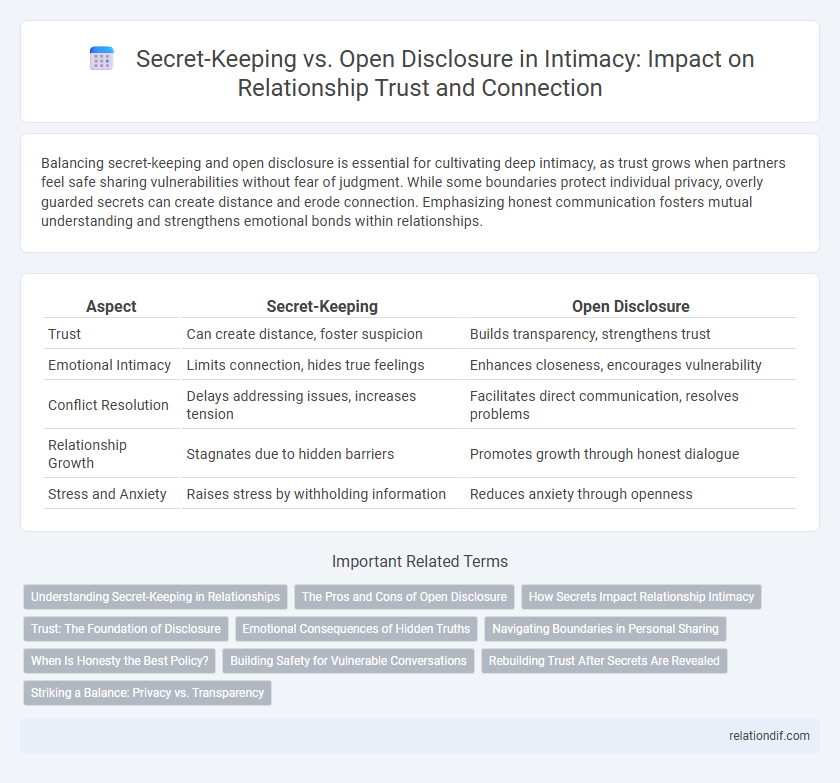Balancing secret-keeping and open disclosure is essential for cultivating deep intimacy, as trust grows when partners feel safe sharing vulnerabilities without fear of judgment. While some boundaries protect individual privacy, overly guarded secrets can create distance and erode connection. Emphasizing honest communication fosters mutual understanding and strengthens emotional bonds within relationships.
Table of Comparison
| Aspect | Secret-Keeping | Open Disclosure |
|---|---|---|
| Trust | Can create distance, foster suspicion | Builds transparency, strengthens trust |
| Emotional Intimacy | Limits connection, hides true feelings | Enhances closeness, encourages vulnerability |
| Conflict Resolution | Delays addressing issues, increases tension | Facilitates direct communication, resolves problems |
| Relationship Growth | Stagnates due to hidden barriers | Promotes growth through honest dialogue |
| Stress and Anxiety | Raises stress by withholding information | Reduces anxiety through openness |
Understanding Secret-Keeping in Relationships
Secret-keeping in relationships often serves as a mechanism to protect loved ones from harm or preserve personal boundaries, yet it can also create emotional distance and mistrust. Open disclosure fosters transparency and strengthens intimacy by promoting honest communication and mutual vulnerability. Balancing privacy with openness is essential for cultivating a healthy and resilient partnership.
The Pros and Cons of Open Disclosure
Open disclosure in intimacy fosters trust and emotional closeness by promoting transparency and honesty between partners. However, it can also lead to vulnerability and potential hurt feelings if sensitive information is shared prematurely or without tact. Balancing openness with empathy ensures that communication strengthens the relationship rather than undermines it.
How Secrets Impact Relationship Intimacy
Secrets in intimate relationships can create emotional distance and erode trust, hindering genuine connection. Open disclosure fosters transparency, allowing partners to build deeper understanding and emotional safety. Maintaining privacy selectively supports intimacy only when it does not undermine honesty or shared vulnerability.
Trust: The Foundation of Disclosure
Trust serves as the cornerstone of open disclosure in intimate relationships, enabling individuals to share vulnerabilities without fear of judgment or betrayal. Secret-keeping often erodes this trust by creating emotional distance and fostering doubts, which can weaken relational bonds over time. Cultivating a culture of honesty and transparency strengthens emotional connections and promotes a secure, supportive partnership.
Emotional Consequences of Hidden Truths
Hidden truths in intimate relationships often lead to emotional distress, including feelings of anxiety, guilt, and mistrust. Secret-keeping can erode the foundation of emotional safety, causing distance and misunderstandings between partners. Open disclosure fosters transparency and strengthens emotional bonds, promoting healing and mutual understanding.
Navigating Boundaries in Personal Sharing
Navigating boundaries in personal sharing requires balancing secret-keeping with open disclosure to maintain trust and emotional safety in relationships. Effective intimacy involves discerning which information fosters connection and which might cause harm or discomfort. Prioritizing transparent communication while respecting privacy enables deeper understanding without compromising individual autonomy.
When Is Honesty the Best Policy?
Honesty is the best policy in intimacy when open disclosure fosters trust, emotional safety, and deeper connection between partners. Secret-keeping can undermine intimacy by creating barriers and breeding suspicion, but strategic discretion may protect feelings during sensitive moments. Assessing the impact of truth-telling on relationship stability and individual well-being helps determine when transparency serves the highest good.
Building Safety for Vulnerable Conversations
Maintaining safety in vulnerable conversations requires balancing secret-keeping with open disclosure to foster trust and emotional security. Secret-keeping can protect privacy but risks eroding intimacy if perceived as withholding, while thoughtful openness encourages transparency and mutual understanding. Prioritizing respectful communication and empathy establishes a safe space where emotional boundaries are honored and authentic connection can thrive.
Rebuilding Trust After Secrets Are Revealed
Rebuilding trust after secrets are revealed requires consistent transparency and sincere communication, as hidden information often disrupts emotional safety in intimate relationships. Commitment to open disclosure fosters vulnerability, enabling partners to address breaches and gradually restore confidence. Psychological studies emphasize that mutual understanding and accountability are critical for repairing relational bonds and promoting long-term intimacy.
Striking a Balance: Privacy vs. Transparency
Striking a balance between secret-keeping and open disclosure in intimacy involves respecting personal boundaries while fostering trust through honest communication. Maintaining privacy allows individuals to preserve a sense of autonomy and emotional safety, whereas transparency strengthens relational intimacy by promoting vulnerability and mutual understanding. Achieving this equilibrium enhances connection without compromising individuality or leading to unnecessary secrecy.
secret-keeping vs open disclosure Infographic

 relationdif.com
relationdif.com